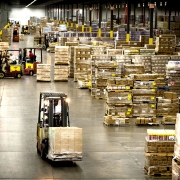A New Age of Feudalism for the Working Class?
In the past, fears of job losses from automation were often overstated. Technological progress eliminated some jobs but created others, and often better-paying ones. In the early days of the high-tech revolution, many of the pioneering firms—such as Hewlett-Packard, Intel, and IBM—were widely praised for treating their lower-level workers as part of the company and deserving of opportunities for advancement, as well as benefits including health insurance and a pension.
The labor policies of the newer generation of tech giants tend to be vastly different. Firms like Tesla have been sued for failing to pay contract workers the legally mandated overtime rates, and for depriving them of meal and rest breaks. The Tesla plant has wages below the industry average, according to workers, and risk of injury higher than the industry average, notes a pro-labor nonprofit. Given that the high housing prices keep them living far from the workplace, some workers sleep in the factory hallways or in their cars.
“Everything feels like the future but us,” complained one worker.
The largest tech employer today is Amazon, with 798,000 employees worldwide in 2019. Amazon tends to pay its workers less than rivals do. Many employees rely on government assistance, such as food stamps, to make ends meet. When the company announced it was adopting a minimum wage of $15 an hour, it also cut stock options and other benefits, largely wiping out the raises, at least for long-term employees.
The average Amazon worker in 2018 made less than $30,000 annually, about the same as the CEO made every 10 seconds.
Working conditions at Amazon are often less than optimal. Warehouse workers in Britain reportedly were urinating in bottles to avoid being accused of “time-wasting” for taking breaks. Amazon has also patented wristbands that track employee movements, described as a “labor-saving measure.” Those who can’t keep up the pace are written up and then fired, said one British worker. “They make it like the ‘Hunger Games.’ That’s what we actually call it.”
Apple manufactures virtually all its products abroad, mostly in China, although medical concerns and political factors might change that. In addition to its own employees there, the company relies on the labor of more than 700,000 workers—roughly 10 times its U.S. employment—to build Apple products at contractors like Foxconn. These workers suffer conditions that have led to illegal strikes and suicides; workers often claim they are treated no better than robots.
From Proletariat to Precariat
In the old working-class world, unions often set hours and benefits, but many low-status workers today are sinking into what has been described as the “precariat,” with limited control over their working hours and often living on barely subsistence wages.
One reason for this descent is a general shift away from relatively stable jobs in skill-dependent industries or in services like retail to such occupations as hotel housekeepers and home care aides. People in jobs of this kind have seen only meager wage gains, and they suffer from “income volatility” due to changing conditions of employment and a lack of long-term contracts.
Read the rest at American Greatness.
Joel Kotkin is the author of the just-released book The Coming of Neo-Feudalism: A Warning to the Global Middle Class. He is the Presidential Fellow in Urban Futures at Chapman University and Executive Director for Urban Reform Institute — formerly the Center for Opportunity Urbanism. Learn more at joelkotkin.com and follow him on Twitter @joelkotkin
Photo credit: Davis Turner via Wikimedia under CC 3.0 License.



